Related Research Articles
Like many other communities, the older Chinatowns face certain social problems. Although Chinatowns are now generally viewed and valued as tourist attractions, their earlier reputation was that of dangerous or dilapidated ghettos and slums, sites of brothels, opium dens, and gambling halls.

The Golden Dragon massacre was a gang-related mass shooting that took place on September 4, 1977, inside the Golden Dragon Restaurant at 822 Washington Street in Chinatown, San Francisco, California, United States. The five perpetrators, members of the Joe Boys, a Chinese youth gang, were attempting to kill leaders of the Wah Ching, a rival Chinatown gang. The attack left five people dead and 11 others injured, none of whom were gang members. Seven perpetrators were later convicted and sentenced in connection with the murders. The massacre led to the establishment of the San Francisco Police Department's Asian Gang Task Force, credited with ending gang-related violence in Chinatown by 1983. The restaurant itself closed in 2006.

Wah Ching is a Chinese American criminal organization and street gang that was founded in San Francisco, California in 1964. The Wah Ching has been involved in crimes including narcotic sales, racketeering, and gambling.
Shui Fong, also known as the Wo On Lok (WOL), is one of the main Triad groups in Southern China, operating especially in Hong Kong, Macau and Chinese communities abroad.
William Lee is an American writer. He is the author of three books. He is a former member of the San Francisco Chinatown gang that was responsible for the 1977 Golden Dragon massacre.
Wo Hop To, or WHT, is a triad group based in Wan Chai, Hong Kong. The name translates to "Harmoniously United Association", or "Harmonious Union Plan", and is thought to have been founded in 1908 in Sai Ying Pun as a secret political organisation in opposition to the Qing dynasty. They are one of the Four Major Gangs (四大黑幫) of Hong Kong, the others being Wo Shing Wo, 14K and Sun Yee On.
This is an alphabetical index of topics related to Asian Americans.
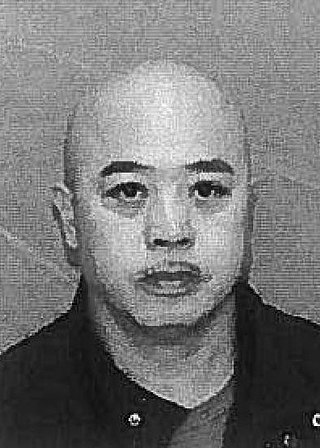
Raymond Kwok-Cheung Chow, nicknamed "Shrimp Boy", is a Hong Kong-born felon with ties to a San Francisco Chinatown street gang and an organized crime syndicate, including the American branch of the Hong Kong-based triad Wo Hop To and the Hop Sing Boys.
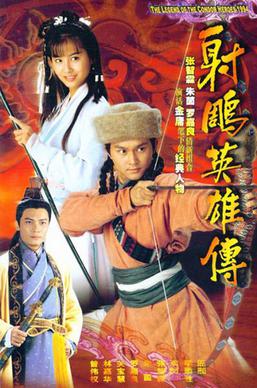
The Legend of the Condor Heroes is a Hong Kong television series adapted from Louis Cha's novel of the same title. The series was first broadcast on TVB Jade in 1994.
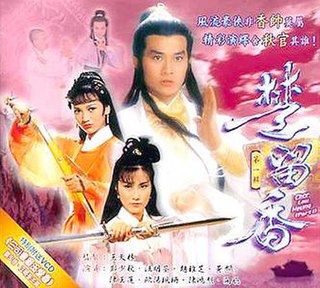
Chor Lau-heung is a Hong Kong wuxia television series adapted from the first three novels in the Chu Liuxiang novel series by Taiwanese writer Gu Long. Adam Cheng starred as the titular protagonist, Chor Lau-heung. The series was first broadcast on TVB on September 3, 1979. The 65 episodes long series was divided into four parts: The Legend of Mo-fa (無花傳奇), The Great Desert (大沙漠), Legend of the Divine Palace (神宮傳奇) and The Final Battle (最後一戰).

New Heavenly Sword and Dragon Sabre is a Hong Kong television series adapted from Louis Cha's novel The Heaven Sword and Dragon Saber. The series was first broadcast on TVB Jade in Hong Kong in 1986.

State of Divinity is a Hong Kong television series adapted from Louis Cha's novel The Smiling, Proud Wanderer. It was first broadcast on TVB in Hong Kong in 1996.
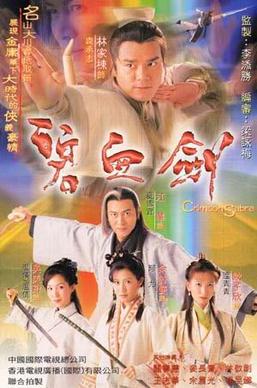
Crimson Sabre is a Hong Kong television series adapted from Louis Cha's novel Sword Stained with Royal Blood. The series was first broadcast on TVB in Hong Kong in 2000.

Gods of Honour is a Hong Kong television series adapted from the 16th-century novel Fengshen Bang, a Chinese vernacular classic written by Xu Zhonglin and Lu Xixing. The series was first aired on TVB Jade in Hong Kong in 2001. It starred Benny Chan, Chin Kar-lok, Irene Wan, Michelle Ye, Dickson Lee, Yuen Wah, Kingdom Yuen and Winnie Yeung in the lead roles.

The Duke of Mount Deer is a Hong Kong television series adapted from Louis Cha's novel The Deer and the Cauldron. It was first aired on TVB in Hong Kong in 1998.
The Jackson Boyz, JBZ or Jackson Street Boys, JSB are or were a San Francisco, California based Asian American street gang and criminal organization The gang, composed of Cantonese and Vietnamese members, has been centered in San Francisco's Chinatown, and was named for Jackson Street. The Jackson Street Boys also have a presence in other U.S. cities.
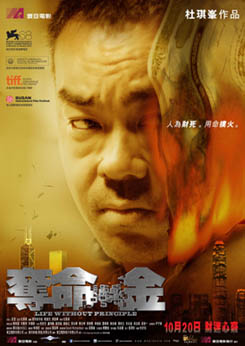
Life Without Principle is a 2011 Hong Kong crime drama film produced and directed by Johnnie To and starring Lau Ching-wan, Richie Jen and Denise Ho. This film was screened in competition at the 68th Venice Film Festival on 9 September 2011. The North America distribution rights was purchased by Indomina Group shortly after the Festival. The deal was made between Indomina and the film's sales agent Media Asia Group.
The Joe Boys, or JBS, was a Chinese American youth gang founded in the 1960s in San Francisco's Chinatown. The Joe Boys were originally known as Joe Fong Boys, after its founder Joe Fong, a former member of the Wah Ching. Most of their members were born in Hong Kong or were of Hong Kongese descent.
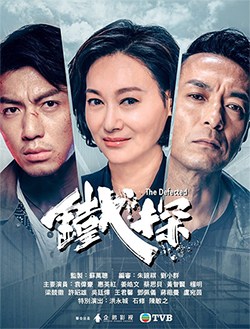
The Defected is a 2019 Hong Kong television drama produced and directed by So Man-Chung, with Carmen So serving as co-director. It is a co-production between the Hong Kong broadcasting company TVB and China's Tencent Penguin Pictures, a television production unit launched by Tencent. It stars Benjamin Yuen as Inspector Sheung Sing, a policeman who becomes embroiled in a conspiracy plaguing the high-ranking officials due to an incident that almost cost him his life.
References
- 1 2 3 Avery, Paul (April 6, 1973). "S.F. Shooting Alibi—Con May Be Innocent". San Francisco Chronicle. Retrieved 9 April 2020. Part 1 | Part 2 | Part 3
- 1 2 3 4 Waugh, Dexter (August 29, 1988). "Joe Fong: From gang leader to grad school". San Francisco Examiner. Retrieved 9 April 2020.
- 1 2 3 4 5 Cardoso, Bill (October 28, 1977). "The Golden Dragon Labor Day Massacre: They shoot tourists, don't they?". New Times., reprinted in "Appendix 13". Unemployment and Crime: Hearings before the Subcommittee on Crime of the Committee on the Judiciary (Report). House of Representatives, Ninety-fifth Congress. 1977–1978. pp. 810–822. Retrieved 9 April 2020.
- 1 2 3 4 Chin, Ko-lin (1990). "5: The Development of Chinese Gangs". Chinese Subculture and Criminality: Non-traditional Crime Groups in America. New York: Greenwood Press. p. 68. ISBN 9780313272622.
- ↑ Muller, Baron (October 22, 1972). "Cops Get Tough in Chinatown". San Francisco Examiner. Retrieved 9 April 2020.
- ↑ Emch, Tom (August 19, 1973). "Will Chinatown Killing End?". San Francisco Sunday Examiner & Chronicle. Retrieved 9 April 2020. Part 1 | Part 2
- 1 2 Ramirez, Raul; Hatfield, Larry D. (September 25, 1977). "The View from Joe Fong's Cell". San Francisco Examiner & Chronicle. Retrieved 9 April 2020. Part 1 | Part 2 | Part 3 | Part 4
- ↑ "Attempt To Free Gang Boss Fail". Santa Cruz Sentinel. AP. October 11, 1973. Retrieved 9 April 2020.